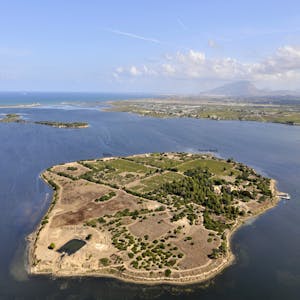At the Origins of the Mediterranean Civilization Archaeology of the City from the Levant to the West - 3rd-1st millennium BC
Which are the deepest roots of that mix of cultures that we use to call ‘Mediterranean Civilization’? Which are comminglings and exchanges which produced its most complete fruit, i.e. the city, a place for landscape-modelling communities? And which elements did contribute to build up that baulk of customs, ideas, and innovations which compelled to confrontation and hybridizations different peoples for millennia? What did it made, from pottery to metallurgy, from gastronomy to architecture, from art to religion, of a sea a cradle of civilization? Archaeology may help in disentangling such questions, seeking unexpected answers , by tinkering what ancient Mediterranean peoples left buried in the ground. A privileged point of view of our course is the ancient Phoenician city of Motya, located exactly at the centre of the “sea in the middle”. Throughout the live experience of excavation, with images taken on the field, this course will let you touch the many tesserae of the great mosaic of the Mediterranean Civilization. The field diary of the archaeologist, and the handpick will be the two tools, which will lead us across the sea to discover what such early cities actually were, and how their contribute is still a major part of our shared memory.
None
Syllabus
Syllabus - What you will learn from this course
Week 1
Towards the West
Week 2
Concept of the city
Week 3
Discovering Motya
Week 4
Life and Ideology
Week 5
Stars sparkling in the waters
Week 6
An Identity to share
Week 7
A changing society
Week 8
Portrait of an harbour city
FAQ
When will I have access to the lectures and assignments?
Access to lectures and assignments depends on your type of enrollment. If you take a course in audit mode, you will be able to see most course materials for free. To access graded assignments and to earn a Certificate, you will need to purchase the Certificate experience, during or after your audit. If you don't see the audit option:
The course may not offer an audit option. You can try a Free Trial instead, or apply for Financial Aid.
The course may offer 'Full Course, No Certificate' instead. This option lets you see all course materials, submit required assessments, and get a final grade. This also means that you will not be able to purchase a Certificate experience.
What will I get if I purchase the Certificate?
When you purchase a Certificate you get access to all course materials, including graded assignments. Upon completing the course, your electronic Certificate will be added to your Accomplishments page - from there, you can print your Certificate or add it to your LinkedIn profile. If you only want to read and view the course content, you can audit the course for free.
Is financial aid available?
Yes. In select learning programs, you can apply for financial aid or a scholarship if you can’t afford the enrollment fee. If fin aid or scholarship is available for your learning program selection, you’ll find a link to apply on the description page.
Reviews
The material was extremely interesting. I have learned many interesting things. Unfortunately, the subtitles were so bad that I had to spend a lot of time to decipher the text.
Please try concentrating on the clarity of the subtitles. It was too difficult to follow the professor without the correct subtitles.
Very enjoyable class which provides evidence of the origins of Mediterranean Civilization with insights as to how these origins are known. Thanks so much!
Thank you Professor Nigrio for your work in putting together this wonderful course. Thanks also to Sapienza University staff who helped in this effort.
